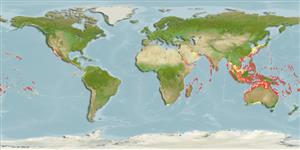Common names from other countries
分类 / Names
俗名 | 同种异名 | Catalog of Fishes(属, 种) | ITIS | CoL | WoRMS | Cloffa
Teleostei >
Anguilliformes (Eels and morays) >
Ophichthidae (Snake eels) > Ophichthinae
Etymology: Leiuranus: Greek, leios = smooth + Greek, oura = tail (Ref. 45335).
More on authors: Lay & Bennett.
Environment: milieu / climate zone / depth range / distribution range
生态学
海洋; 半咸淡水 礁区鱼类; 深度上下限 0 - 10 m (Ref. 86942), usually 0 - 10 m (Ref. 37816). 热带; 40°N - 40°S
Indo-Pacific: East Africa to the Hawaiian, Marquesan, and Mangaréva islands, north to southern Japan, south to northern New South Wales, Australia. Also recorded from Southeast Atlantic: South Africa (Ref. 3972).
印度-太平洋: 东非到夏威夷,马贵斯群岛与曼加雷瓦群岛, 北至日本南部, 南至新南韦尔斯的北方,澳洲。
大小 / 重量 / 年龄
Maturity: Lm ? range ? - ? cm
Max length : 66.0 cm TL 雄鱼/尚未辨别雌雄; (Ref. 1602)
背棘 (总数) : 0; 背的软条 (总数) : 0; 臀棘: 0; 臀鳍软条: 0; 脊椎骨: 162 - 171. White to yellow with 25-30 black saddles (Ref. 3972).
白色到黄色的具有 25-30个黑色的鞍状斑.(参考文献 3972)
Occurs in sandy areas and seagrass beds of both lagoon and seaward reefs. Uses its stiff pointed tail to rapidly burrow backwards into the sand when frightened (Ref. 37816). Benthic (Ref. 58302). Feeds on sand-dwelling fishes and crabs and prawns. Sometimes fully exposed when searching for prey (Ref. 30874). Rises to the surface to spawn (Ref. 37816).
出现于两者泻湖与临海礁石的沙地与海草床。 使用它的硬尖的尾部快速地向后进入沙子之内当被惊吓时掘洞穴。 (参考文献 37816) 吃栖息于砂中的鱼与螃蟹与虾。 当寻找猎物的时候,有时完全暴露出来。 (参考文献 30874) 上升到水面产卵.(参考文献 37816)
Life cycle and mating behavior
Maturities | 繁殖 | Spawnings | Egg(s) | Fecundities | 仔鱼
Rises to the surface to spawn. Once there, one or more males may seize a female by the back of the neck and remain attached for hours before spawning occurs.印度-太平洋: 东非到夏威夷,马贵斯群岛与曼加雷瓦群岛, 北至日本南部, 南至新南韦尔斯的北方,澳洲。
Myers, R.F., 1991. Micronesian reef fishes. Second Ed. Coral Graphics, Barrigada, Guam. 298 p. (Ref. 1602)
CITES (Ref. 128078)
Not Evaluated
人类利用
工具
特别资料
下载 XML
网络资源
Estimates based on models
Preferred temperature (Ref.
115969): 24.4 - 29.2, mean 28.1 (based on 2893 cells).
Phylogenetic diversity index (Ref.
82804): PD
50 = 0.7500 [Uniqueness, from 0.5 = low to 2.0 = high].
Bayesian length-weight: a=0.00089 (0.00039 - 0.00204), b=3.00 (2.80 - 3.20), in cm Total Length, based on LWR estimates for this (Sub)family-body shape (Ref.
93245).
营养阶层 (Ref.
69278): 3.1 ±0.3 se; based on diet studies.
回复力 (Ref.
120179): 中等的, 族群倍增时间最少 1.4 - 4.4年 (Preliminary K or Fecundity.).
Fishing Vulnerability (Ref.
59153): Moderate to high vulnerability (46 of 100).
